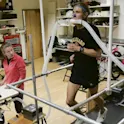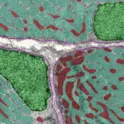
Featured news
10 May 2022
Children grow faster during school year than during summer holidays
By Mischa Dijkstra, Frontiers science writer Image credit: MIA Studio / Shutterstock.com Children grow faster during the school year than during the summer period, show scientists. In contrast to the strong seasonality of vertical growth, there is little seasonality in increase in body weight over time. Slower vertical growth affects the BMI and contributes to the “obesogenicity” of the summer period. It has been long recognized that in Western countries, children are more likely to become overweight or obese over the summer. Causes of this include changes in kids’ physical activity and diet over the summer period, including the summer holidays. But in a new study in Frontiers in Physiology, scientists from the US show that this ‘obesogenicity” of summers has another unexpected cause: children grow faster over the school year than over the summer. And because Body Mass Index (BMI) is the ratio of body weight in kg and height in meters squared, faster vertical growth during the school leads to increased BMI during summers. “Here we show seasonality in standardized body mass index (BMIz), with children gaining height at a greater rate during the school year compared to the summer,” said Dr Jennette P Moreno, an assistant professor […]













